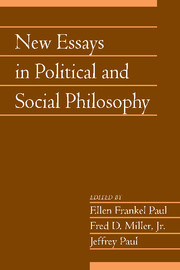Book contents
- Frontmatter
- Contents
- Introduction
- Acknowledgments
- Contributors
- Political Liberty: Who Needs It?
- State Coercion and Force
- Political Legitimacy and Economic Liberty
- Who Owns What? Some Reflections on the Foundation of Political Philosophy
- Human Reproductive Interests: Puzzles at the Periphery of the Property Paradigm
- Why Free Trade is Required by Justice
- Structural Exploitation
- Rescuing Justice from Equality
- Reinterpreting Rawls's The Law of Peoples
- Responsible Choices, Desert-Based Legal Institutions, and the Challenges of Contemporary Neuroscience
- Genocide and Crimes Against Humanity: Dispelling Some of the Conceptual Fog
- Harm and the Volenti Principle
- Education and the Modern State
- Index
Harm and the Volenti Principle
- Frontmatter
- Contents
- Introduction
- Acknowledgments
- Contributors
- Political Liberty: Who Needs It?
- State Coercion and Force
- Political Legitimacy and Economic Liberty
- Who Owns What? Some Reflections on the Foundation of Political Philosophy
- Human Reproductive Interests: Puzzles at the Periphery of the Property Paradigm
- Why Free Trade is Required by Justice
- Structural Exploitation
- Rescuing Justice from Equality
- Reinterpreting Rawls's The Law of Peoples
- Responsible Choices, Desert-Based Legal Institutions, and the Challenges of Contemporary Neuroscience
- Genocide and Crimes Against Humanity: Dispelling Some of the Conceptual Fog
- Harm and the Volenti Principle
- Education and the Modern State
- Index
Summary
This is an essay on the limits of the Criminal Law. In particular, it is about what principles, if any, determine whether it is legitimate for the state to criminalize certain conduct. Joel Feinberg in his great work on the moral limits of the criminal law argues that we need only two principles. One is a principle regulating harm to other people and the other is an offense principle regulating certain kinds of offensive conduct. I examine various aspects of his argument. In particular I concentrate on his use of the Volenti Principle: He who consents cannot be wrongfully harmed by conduct to which he has fully consented. Feinberg uses the principle to argue that certain kinds of consensual conduct cannot be forbidden unless we adopt some kind of legal moralism, that is, unless conduct can be forbidden on the grounds that it is immoral even though the conduct harms no other person. The first section provides an overview of Feinberg's account of the limits of criminalization. The subsequent sections explore the possibility of prohibiting certain kinds of consensual conduct while avoiding legal moralism by limiting the use of the Volenti Principle.
- Type
- Chapter
- Information
- New Essays in Political and Social Philosophy , pp. 309 - 321Publisher: Cambridge University PressPrint publication year: 2013



